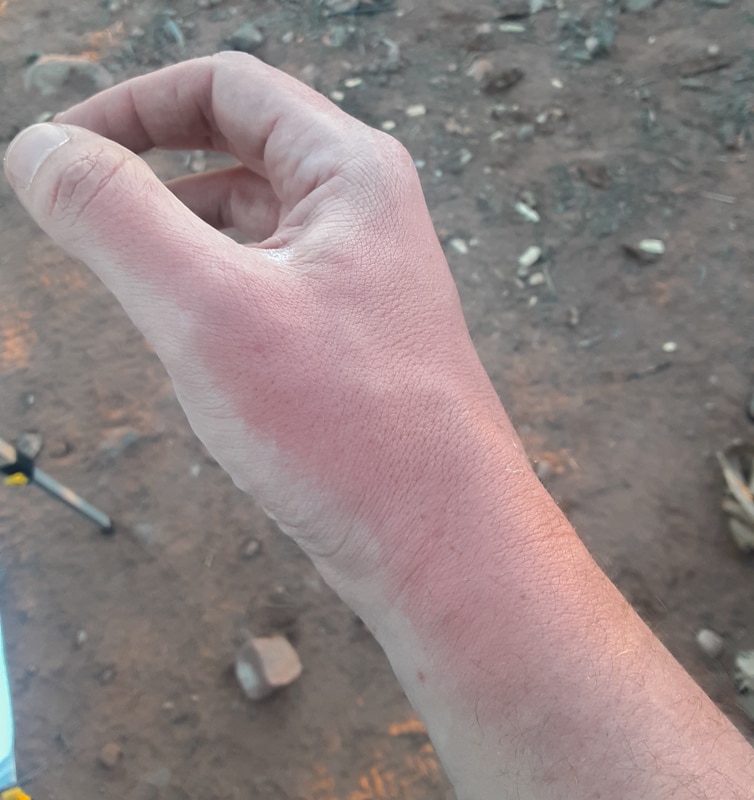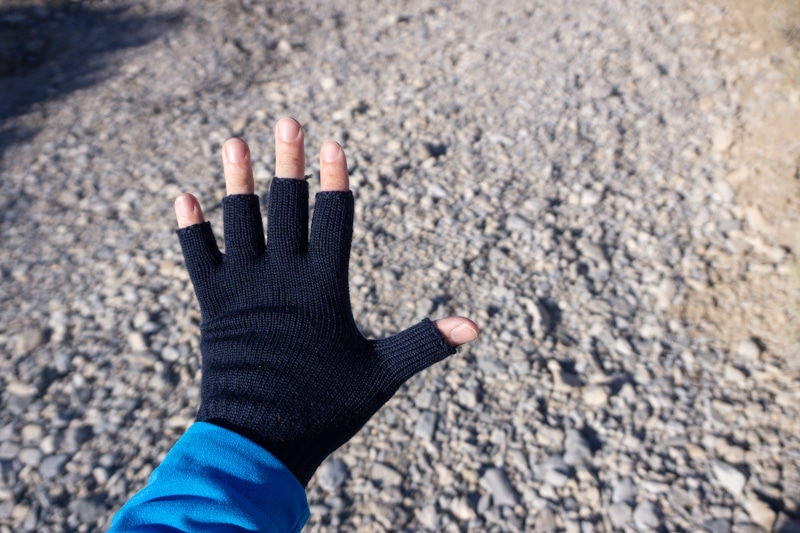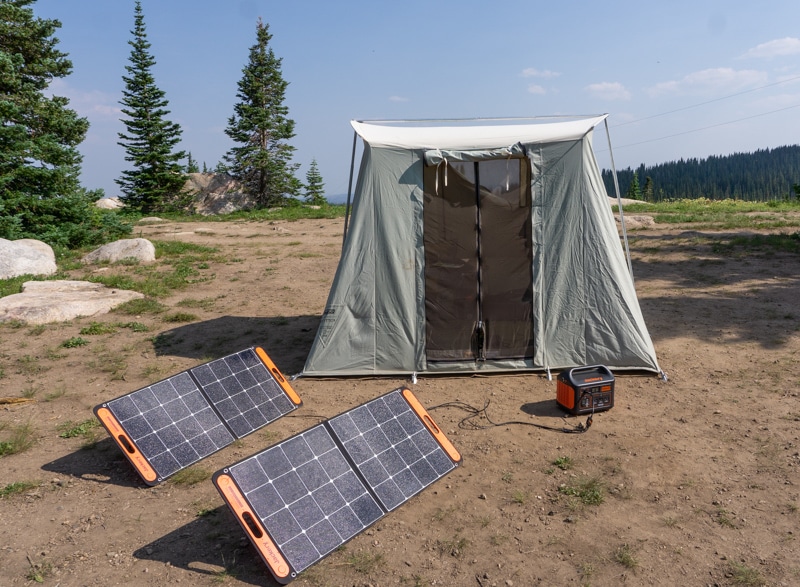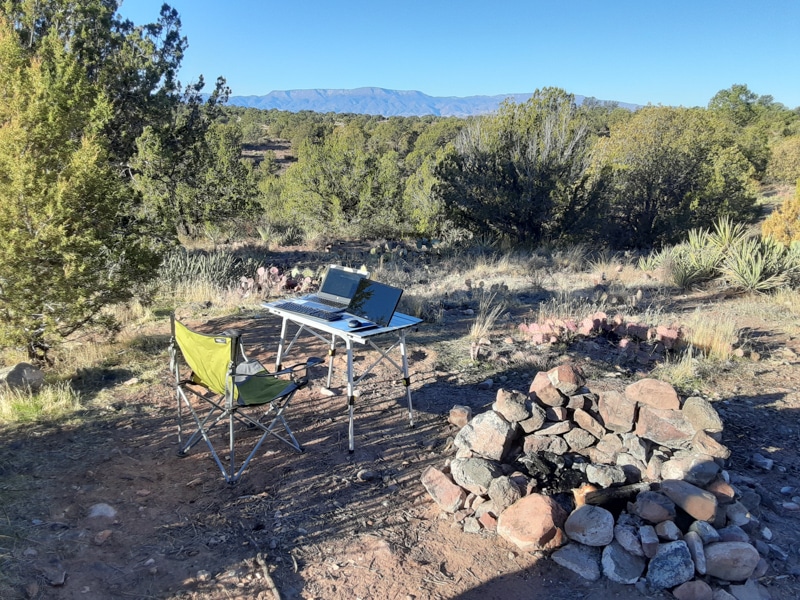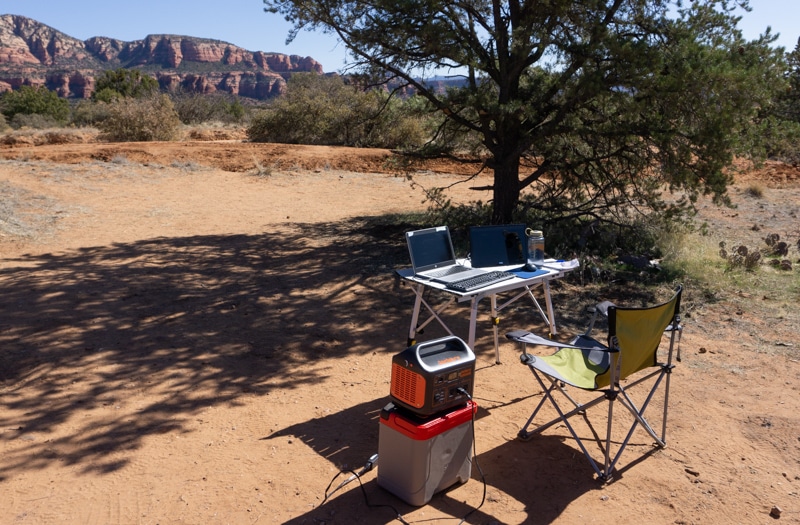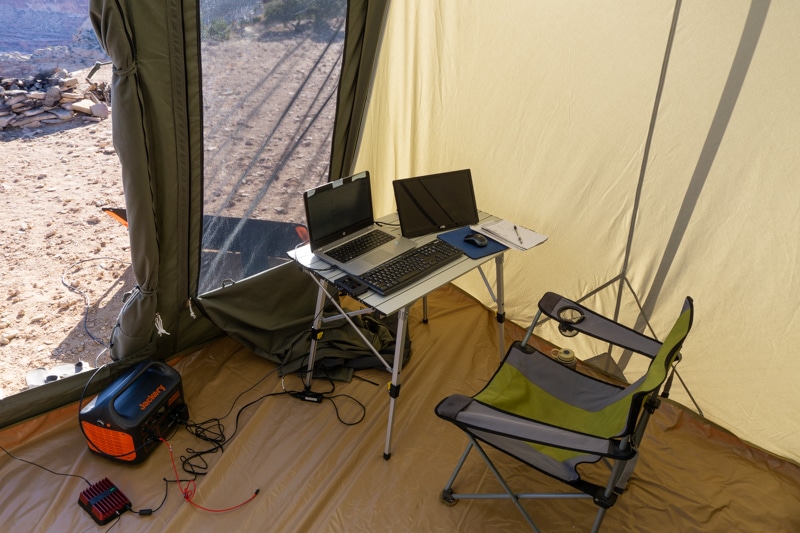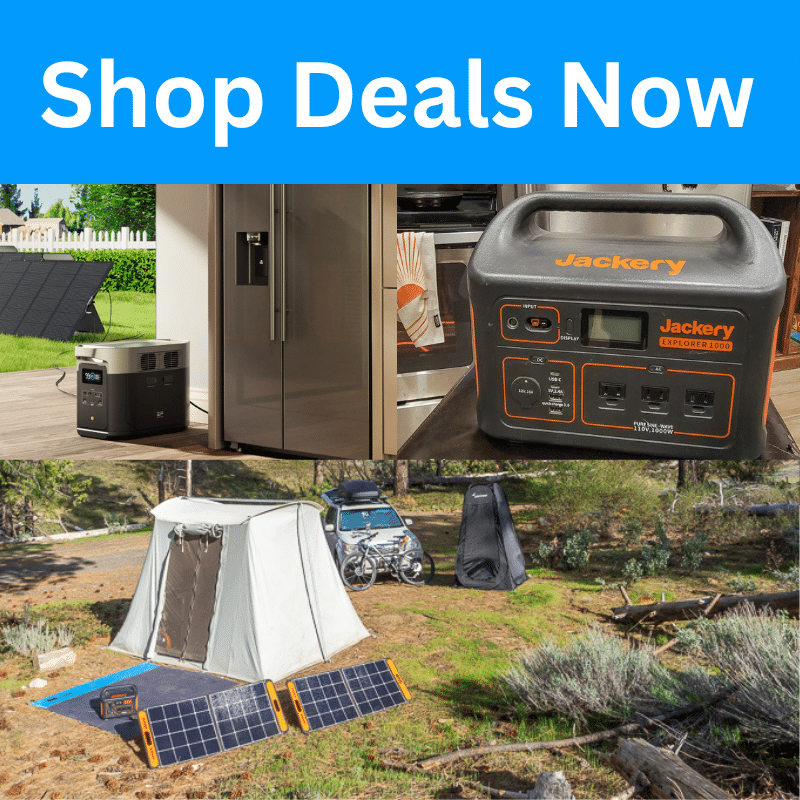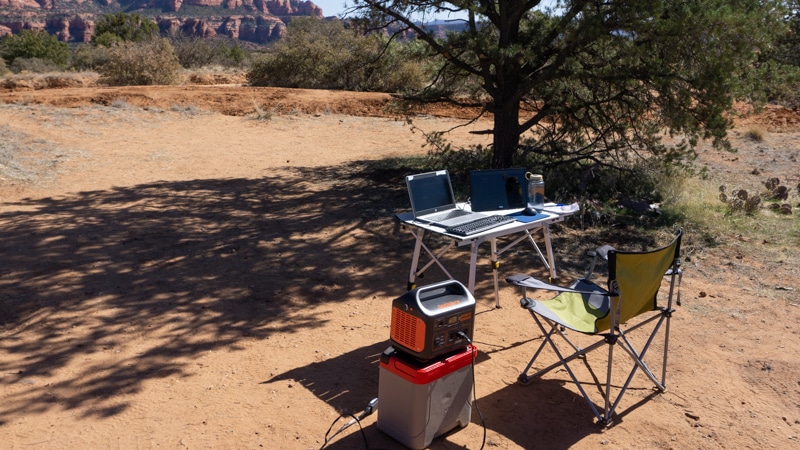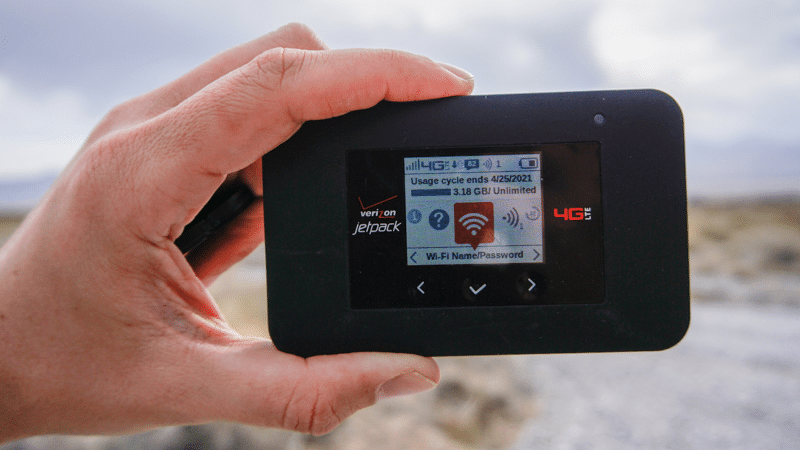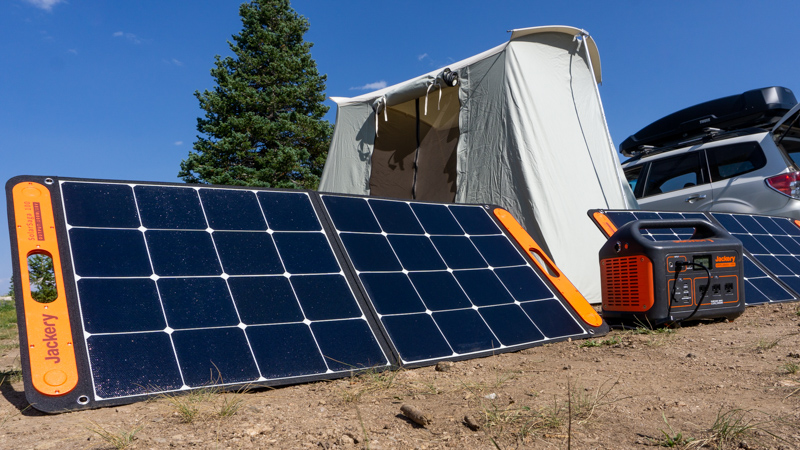Working while camping is something I’ve chosen to do in order to spend more time in particular locations, save on driving time, and take extended road trips.
The average outdoors person may frown upon seeing someone open up a laptop in the middle of nowhere. What they don’t see is how much more time one can spend outdoors if they are able to work remotely and be productive at the same time.
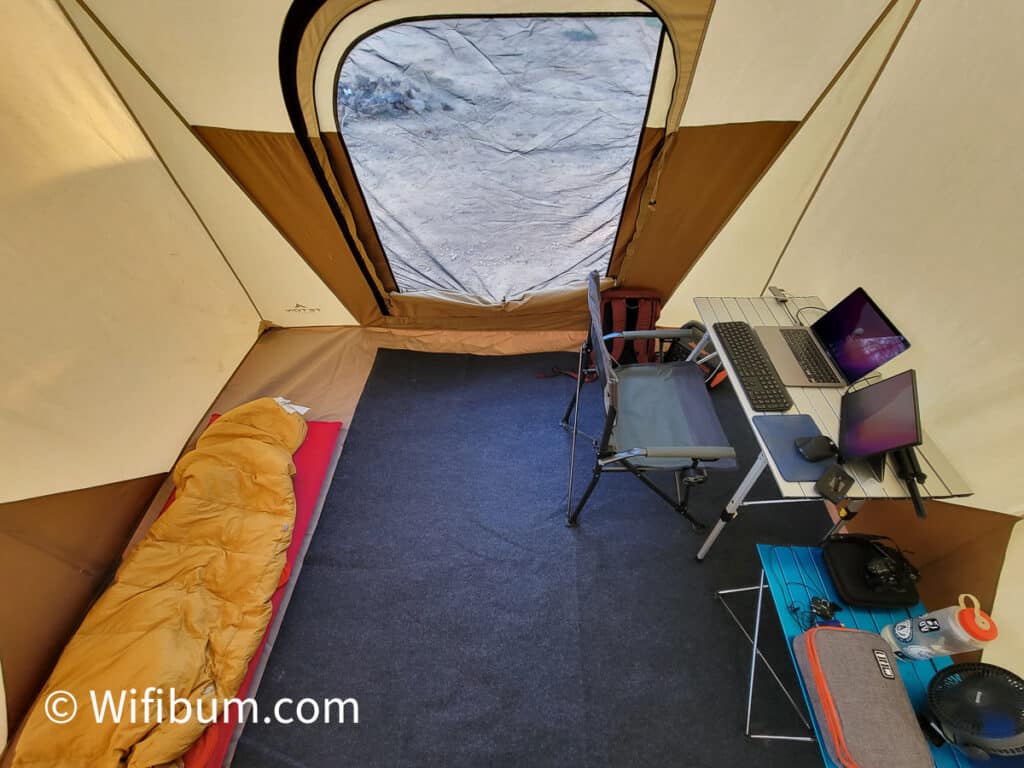
Whether you’re looking to work while camping long-term or on an extended weekend trip, this article will help. I’ll cover the gear I use (full list), mistakes to avoid, and how to find campsites with cell service and more.
Jump to any section:
- Working While Camping: Gear You Need
- What Working While Camping is Not – #sorryinfluencers
- 7 Things I Wish I Knew before Working While Camping
- How to Be Productive While Working While Camping
- Finding a Campsite to Work Remotely From
- How to Power Your Camping Work Trip
Some product links in this article may be affiliate links. I have never accepted free or discounted gear. All opinions on gear are my own.
Working While Camping: Gear Overview
The gear you need for working while camping will vary depending on a variety of factors. Do you need strong signal? Do you need to work a few hours, a few days, etc. My setup is for long-term camping, so you can scale it back to fit your needs.
Here’s a 2-minute video I created showing my 2023 gear and setup.
I’ve been working remotely since 2018, including working while camping. I have spent an entire summer living in a tent and living out of an SUV.
The most important gear is power (like a Jackery) and getting wifi while camping. If you have to do more than a few hours of work, then having a proper setup with a good table, tent, etc. is also important. (full gear list).
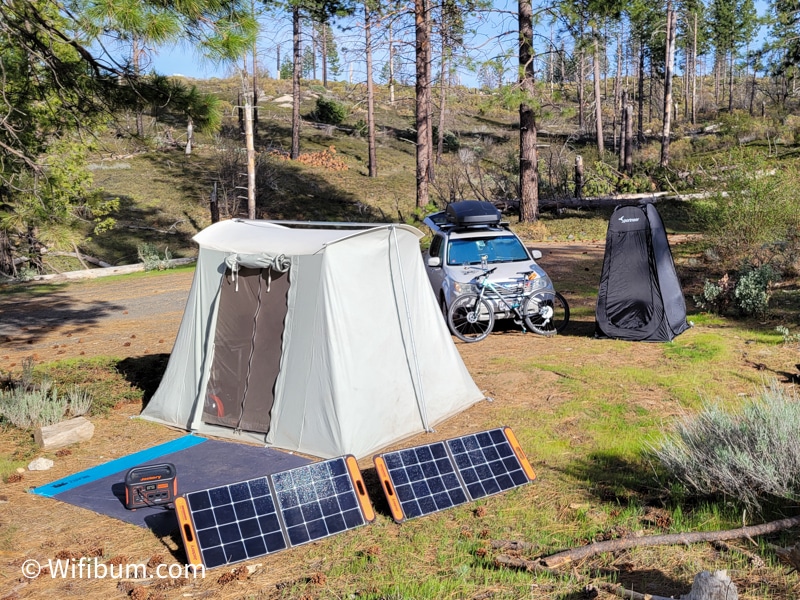
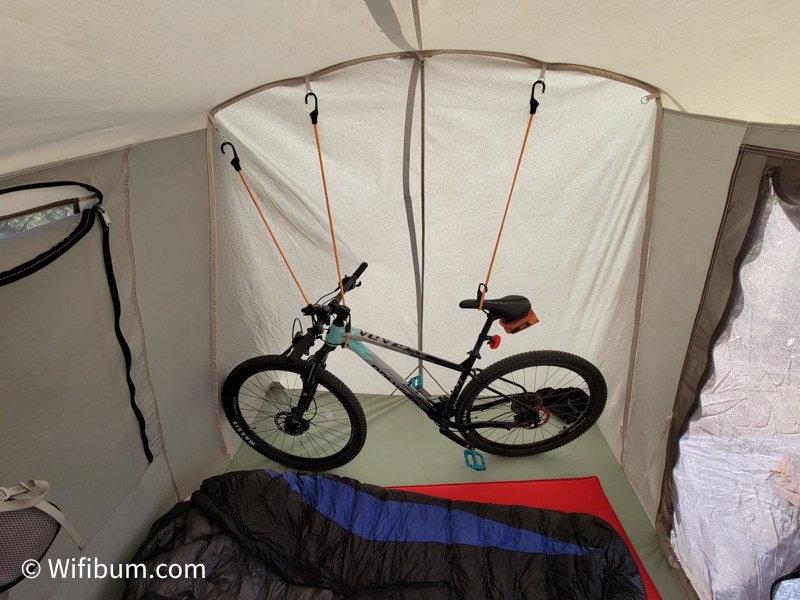
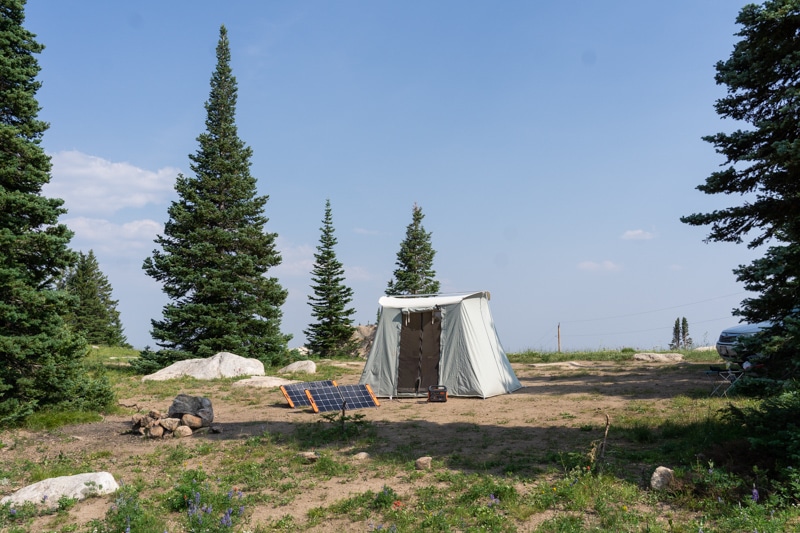
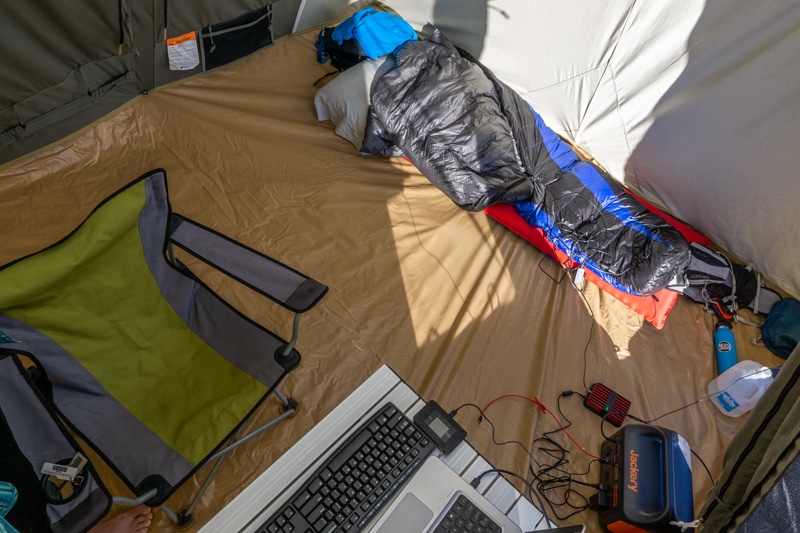
It is surprising how many awesome places you can camp with cell service even without cell signal booster (read my weBoost review, does it work?.
Working While Camping: What It Is Not
Sorry Instagram and Google. The working remotely while camping articles in Googles search results are obnoxious.
There are pictures of people working next to a campfire using their cooler as a desk.
There is one where the guy is sitting on the bed of his truck working.
Another top result shows a person with their back against a tree working on a laptop.
I’m going to call bullshit on each one of these articles and bet that NONE of them were actually productive.
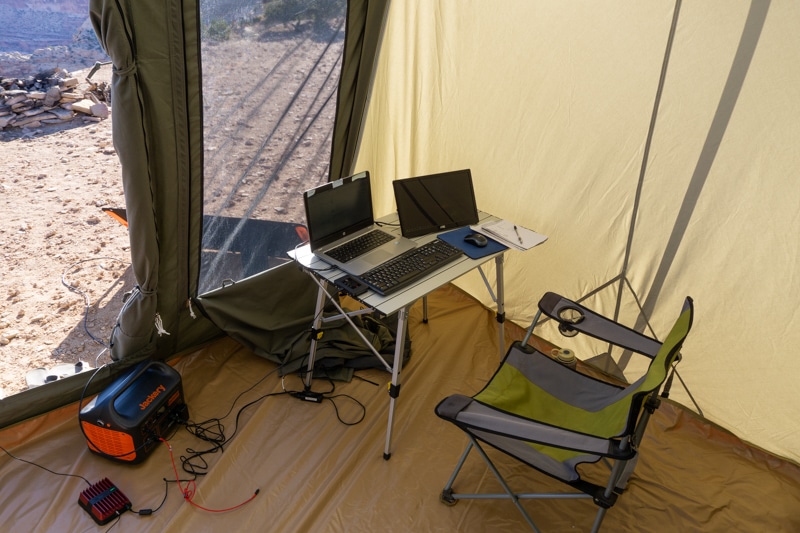
It may make for a “cool” Instagram photo, but I doubt they were doing any real work in those setups.
How do I know? Because that’s how I looked the first time I tried working while camping. And it was an absolute shit show.
It took me about 4-5 times of working while camping to finally start being about 80% as productive as I was at home.
The image below is one of those first times.
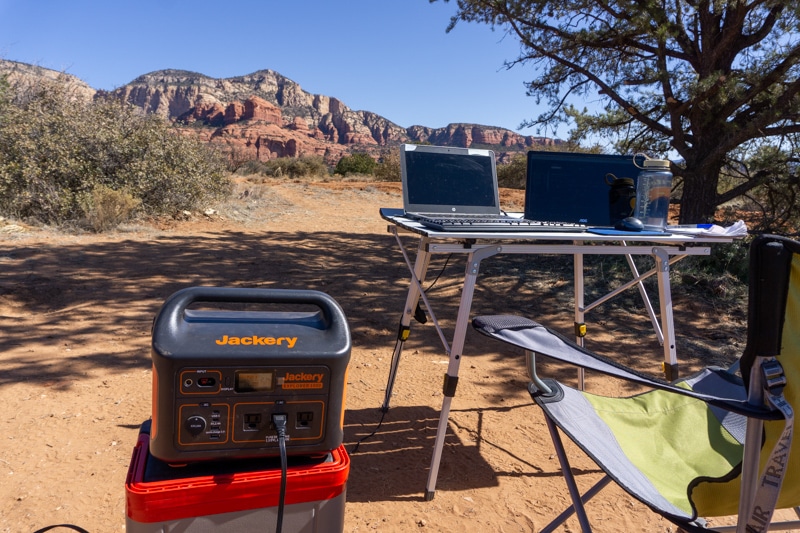
The glare was so bad in the sun, yet I needed to be in the sun to stay warm (this was February). By the way, I still use that table as my outdoor desk. And I now use these typing gloves for the cold.
Working While Camping: 7 Things They Fail to Mention
Working while camping should be done as a means to do more outside in the area you choose to spend time in.
If you do not plan properly, you may end up being at your computer for more hours due to lost productivity which defeats the purpose of working while camping!
The first time I tried working from a remote campsite the following things happened:
- It didn’t warm up until about 9 or 10am so I stayed in my sleeping bag (link to a review of my current sleeping bag) until then while trying to work laying down. Great start to the day!
- Once the sun finally came out, it was so bright the glare essentially turned my Macbook Air portable monitor into a mirror and I couldn’t read anything on it easily.
Then I eventually got sunburnt on my mouse hand (pictured in the slideshow below!). That’s when I purchased some fingerless typing gloves for a combination of warmth and sun protection. - There was only one tree at my camp, so the entire time I moved my portable work desk (link to outdoor desk discussion) slowly around a tree to stay in the shade to try and see my screen better.
- Bugs bombarded me as soon as the sunset. My monitor, and in turn, my face, became a welcoming environment for all the insects of the land.
- ATVs drove by at all hours of the day. Plan your Zoom meetings accordingly. They also can kick up dust.
- It felt unnerving knowing everyone that passed by saw my setup and all the gear I had so did not feel like leaving it alone so had to pack it up in my car each time I left camp. Check out my tent locks and basic gear safety post. I now have a portable car safe.
- I walked around with my wifi device like it was a metal detector to find the best internet in a 50x50ft radius. Sometimes moving it 1 inch would mean my connection went to unworkable.
See the progression in the gallery below!
How to be Productive Working While Camping
I didn’t have any real gear to begin with (see my current gear here). The most important thing I did was go out and try it.
I have solved many of the issues above by using a canvas tent (Learn more about Canvas tents). They are great for harsher conditions, but they are only needed if you’re really getting serious working outdoors.
While a fully decked-out off-road capable campervan would be awesome, I can’t justify the price. I actually enjoy using my old Subaru Forester to get to spots that those with larger rigs cannot.
Here’s a 4 photo slide show to show working while camping progression. Any setup can work. Your level of productivity and comfort will be different, though.
Creating an “Outdoor Office” for Working Remotely
Here’s my current “work remote camping” set up (last picture above):
- Large Canvas Tent – provides ample room and can handle rain and wind. Read my Springbar vs Kodiak canvas tent review here. Or use a screen tent.
- Portable Work Desk (See how I found the right one so you don’t have to) – it fits my laptop, portable monitor, keyboard, and mouse.
- Jackery Battery Pack connected to Jackery Solar Panels provides an abundance of energy for my needs. Determine your energy needs with my article. It includes the thought process you should use so you don’t get too much or too little power.
- Verizon Jetpack for internet (read how to get internet while camping).
- WeBoost Signal Amplifier helps go from “barely workable” to “workable” wifi. See me testing a WeBoost here.
- And of course, a basic camp chair (my thoughts on outdoor office chairs!
This set up really allows me to feel comfortable while working remotely.
The canvas tent is durable, waterproof, and windproof. After about 20 to 25mph winds, it does get loud from the tent flapping around, but they are durable.
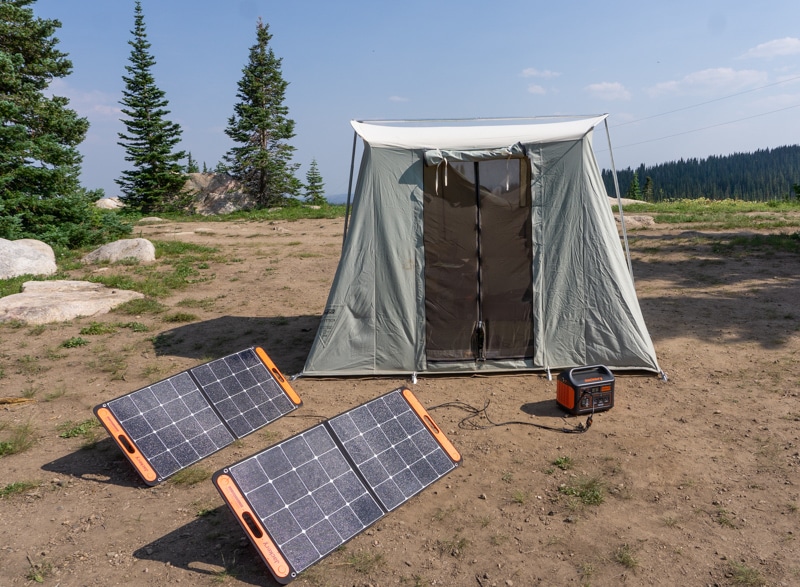
Finding Campsites for Remote Work (Cell Service and Wifi)
My favorite service to use for finding camping spots with good wifi to work is Campendium. I’ve also started using iOverlander a bit more in my standard research.
If you’re serious about working on the road, read my full article here.
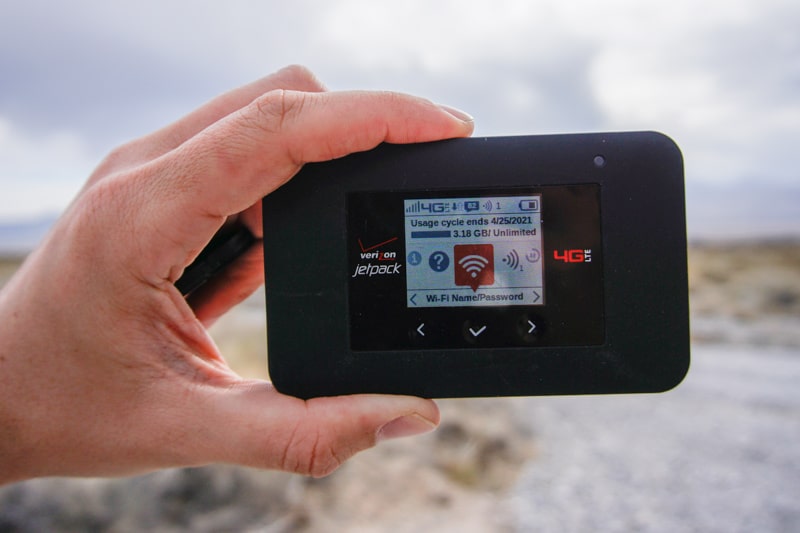
Note: there is a one-time fee for the device, then you have to work with Verizon to get it activated and added to your plan. It's cheap to add to existing plans.
You can search Campendium with filters for public land/free camping AND filter by your service provider such as AT&T, Verizon, etc.
I believe you have to pay a small annual fee for being able to filter by cell coverage, but to me, it is worth it.
For Campendium, you have to read the comments for each campsite and make sure more than one or two people are saying they had good service. I’ve gone to a few that had worse service than expected because I only relied on one review.
For iOvelrander, there is a spot on each pin that the reviewer can add info about cell signal, but I don’t trust it as much UNLESS there is also a comment to go along with it about someone saying if they had service and its strength.
I take the best sites based on my filters and reading the reviews and add them to a google map like this (now I’ve been using Gaia GPS which I have found to be FAR superior and easier to use):
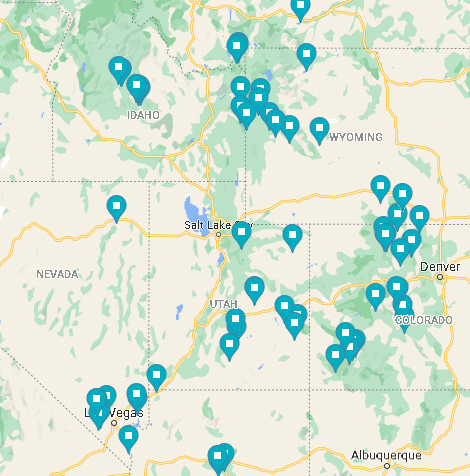
Another thing to note is whether you have a wifi booster. That will help make up for some errors in this decision, but sometimes the booster cannot save you from that either.
How to be Productive While Camping?
Plan, plan, plan!
I plan a lot. Not only my trips, but also my work schedule.
I also try to plan what I will do during the evenings to take advantage of the extra time outdoors. Or if you’re in a real cool spot, going on a run or a bike ride around lunch can really make your day feel much more fun.
If I know I have a big week of work ahead, I avoid taking a trip. Or if I do take a trip, I will try to make sure I have a real town nearby if I need to hunker down at a coffee shop for a couple days.
Nothing is more frustrating than getting to an area and having less service than you expected and then having to drive back to service and try to plan it from your phone.
I try to find one good spot and stay there rather than picking up and moving a lot. The more efficient I can be, the better.
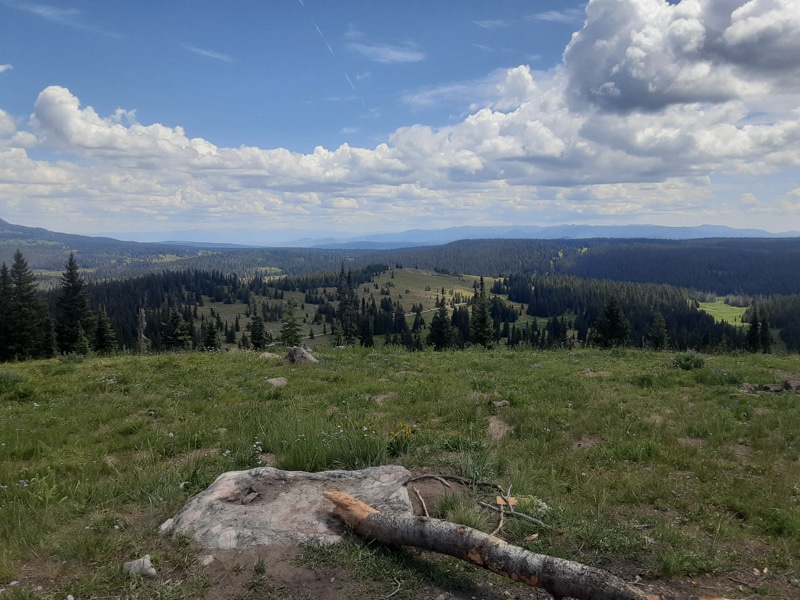
The three keys you need to consider for a successful camping work trip:
- Will you have a good-enough wifi connection? Learn more about camping wifi here.
- Do you have enough power for how long you need to work? This can be from a battery packs, solar, or some sort of combination. Determine your power supply here.
- Do you have a comfortable work area? Working in your passenger seat or on a tree stump isn’t going to cut it for most. This is how much thought went into my portable work desk.
In addition, if you know you’re going to be close to a town, you can always work from a library or coffee shop.
How to Power Your Camping Work Trip?
I’ve covered this topic extensively, so I will point you to this article:
The Best Camping Power Supply for Working Remotely
This is probably the easiest problem to solve because you can just throw money at the problem rather than doing in-depth planning.
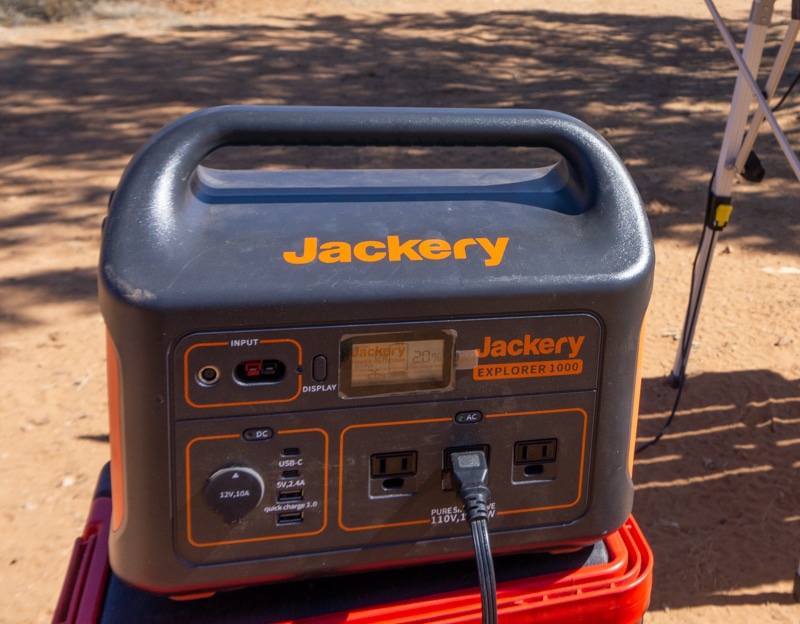
Planning Doesn’t Always Work: Be Prepared for Hiccups
It is inevitable that you will get to an area and you won’t have any service or it will be so packed with other campers you can’t find a good camping spot.
Working while camping is best for work that can be done within days rather than working with hard deadlines. Make sure you are within a reasonable drive to a town with cell coverage if needed.
Overall, have fun and get out there. If it goes wrong, you’ll have some good stories. I sure do.
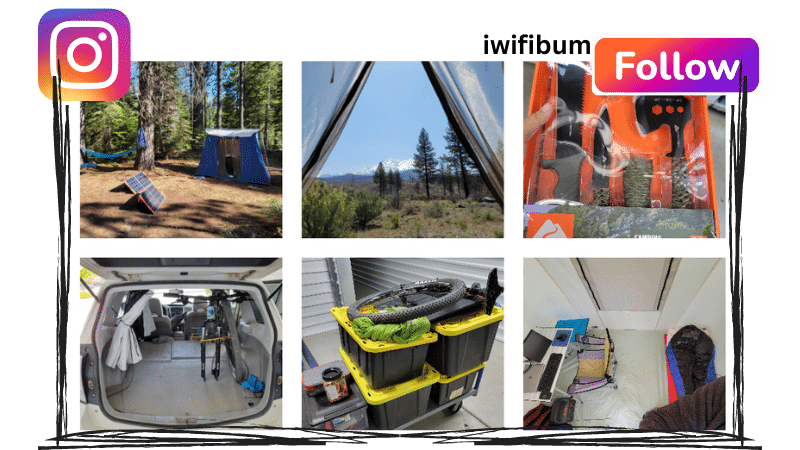
Related Articles
WeBoost Reviews: Does it Work? I test it out.
